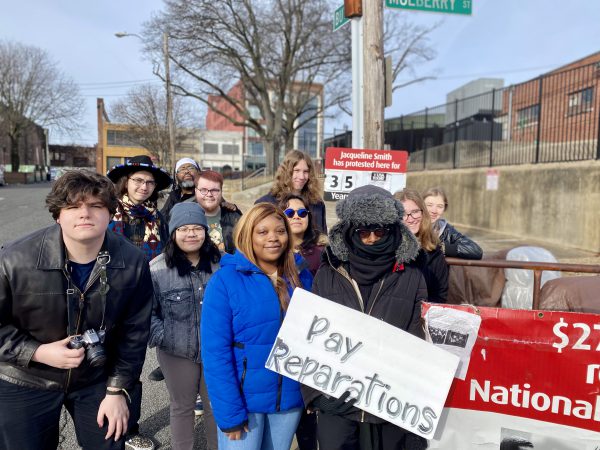A fictional play coming to Kalamazoo College’s Festival Playhouse will invoke one of history’s greatest civil rights leaders and consider how he might have viewed his own legacy the night before he was killed.
Assistant Professor of Theatre Arts Dr. Quincy Thomas will direct The Mountaintop, a two-actor play about Martin Luther King Jr. and his mark on history, for the Festival Playhouse’s winter production this month.
“One of the interesting things about this play is that none of the lines from it are Dr. King’s,” Thomas said. “When we’re dealing with Black narratives, it’s important to remember that the most recognizable ones have been done a particular way many times. We don’t really need another true-to-life depiction of Dr. King. I think (playwright) Katori Hall knew that and thought to herself, here’s an opportunity to tell a human version of Dr. Martin Luther King that we’ve never seen. Like a great dramaturg would, she did a ton of research to create who Dr. King is, so it’s founded on truth. But the story is a creative reimagining of Dr. King.”
The play’s title refers to the 1968 speech King delivered to a Memphis church congregation during the city’s sanitation workers’ strike. Through it, King admitted he expected difficult days ahead in the civil rights movement, but he wasn’t worried. Instead, he was focused on the mountaintop, a symbol for a promised land of a desirable, equitable society created through God’s will.
In the play, King—played by K alumnus Jared Pittman ’20—retires to room 306 at the Lorraine Motel on April 3, 1968. A young hotel maid, Camae, played by Milan Levy ’23, visits him during the night and they flirt.
“Even after it was performed, (Katori Hall) still got backlash because all of a sudden there’s a Martin Luther King who smells his shoes and realizes that they stink; who one minute is trying to get a hold of his wife and the next is having flirtatious conversations with a stranger,” Thomas said. “He’s smoking, he’s drinking, and a lot of people don’t want the iconography of Martin Luther King tarnished. But this play asks us to consider our private life versus our public life. It asks us to consider Martin Luther King the icon versus Martin Luther King the man. I think the playwright didn’t give us a depiction of a King we are used to seeing, but one that is very resonant, attainable and recognizable.”
Camae later reveals a surprise to King that forces him to confront his own and society’s future.
“On the surface, it doesn’t seem like the two have a lot in common,” Thomas said. “We then find out Martin Luther King has to come to terms with his iconic status based on what Camae reveals. He has to see that despite everything he’s done, he is saddled with mortality and that’s painful. Anytime anyone does a remake of Romeo and Juliet, we watch it despite knowing how it’s going to end. We know how this show ends the moment we find out that it’s Martin Luther King. He is sent somebody who’s going to take him on to the next chapter of his journey, and when you’re so special that you get that kind of treatment, that’s humbling. At the same time, he’s not going to talk his way out of dying.”
Pittman and Levy will shape the main characters on stage, while Caleb Allen ’25 will ensure the audience understands the history involved, the scenes, their words and their historical points of reference through lobby displays as the play’s dramaturg.
“Caleb has been with us since the week of table work and he’s at every rehearsal,” Thomas said. “He’s doing a lot of historical work about the Lorraine Hotel, about Memphis, about the sanitation strike, and about who King is and who he was. There’s a lot of King’s work that is implied, and Caleb will help us make sure, for this particular audience, that nothing is lost in translation.”
The production will be staged at the Playhouse, 129 Thompson St., at 7:30 p.m. from Thursday, February 23–Saturday, February 25, and at 2 p.m. Sunday, February 26. Tickets are available online or by calling 269.337.7333. Please note that attendees must wear a mask and provide proof of their COVID-19 vaccination.
“At the end of the day, I think my job is to ensure that the audience walks away understanding that Martin Luther King was a man who had done great things that shaped his legacy, but he was a man,” Thomas said. “He wasn’t perfect. Our Black heroes don’t have to be perfect. One of the things we never talk about with Martin Luther King is the way the life he lived affected him physically. In the play, it’s thundering outside and there are multiple times where he thinks that the thunder is a gunshot. There’s a moment when he hyperventilates because he thought he had been shot. There are places in the script where he’s checking to see if his room is bugged. He’s double checking the lock. He’s double checking the chain. He was a great man. But he was also a man with flaws and fears. I think I would like our audience to understand that because Dr. Martin Luther King was a man who became an icon, every person can be an agent of change because agents of change don’t have to be perfect.”

Walking in Memphis

- Members of the Festival Playhouse production team for The Mountaintop visited room 306 of the Lorraine Hotel, where Martin Luther King Jr. spent his last night alive, which is now part of the National Civil Rights Museum in Memphis. They also toured the museum of soul music Stax, the Rock ‘n’ Soul Museum, and a Smithsonian exhibit highlighting the birthplace of Memphis blues and soul music.
- In the top photo, director Quincy Thomas, stage manager Isaiah Calderon, assistant director Brooklyn Moore, assistant scenic designer Julia Holt, publicity and marketing director Marquisha James, head usher Marilu Bueno, dramaturg Caleb Allen, projection designer James Hauke and sound board operator Davis Henderson meet with civil-rights legend Jacqueline Smith. Smith was evicted from the Lorraine Motel, along with her possessions, in 1968 and has protested there for 35 years.
- In the bottom photo, Marquisha James poses in front of the Lorraine Hotel at the National Civil Rights Museum.

